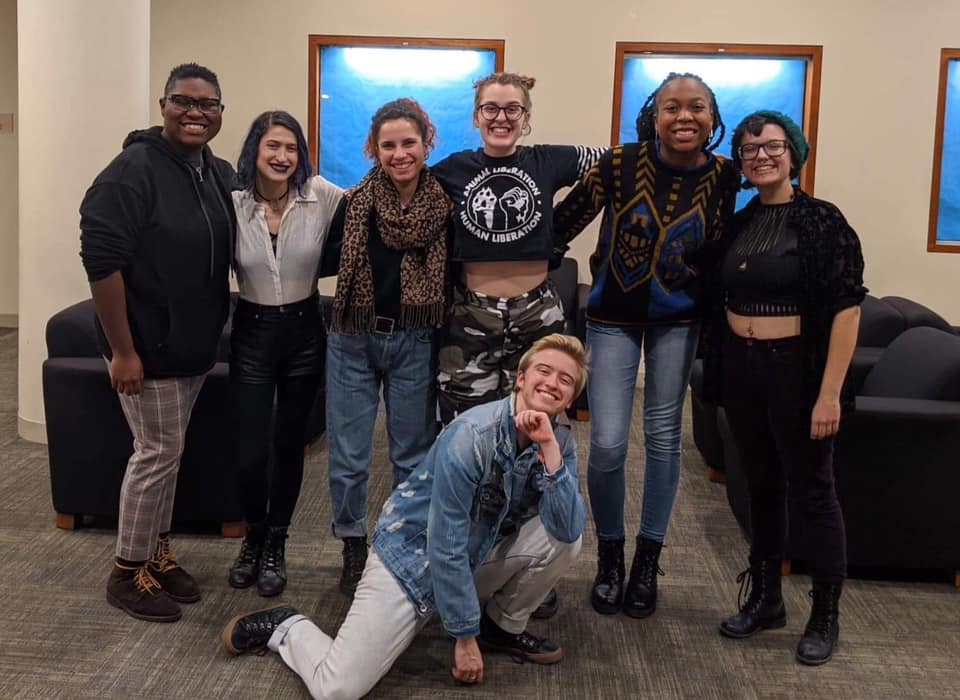MacSlams Adapts to the Era of Zoom
Contact
The Words: Macalester's English Student NewsletterSenior Newsletter Editors:
Birdie Keller '25
Callisto Martinez '26
Jizelle Villegas '26
Associate Newsletter Editors:
Ahlaam Abdulwali '25
Sarah Tachau '27
by Alice Asch ‘22

MacSlams, Macalester’s slam poetry organization, has powered through this wild year, and shifted our community online. Nothing can compare to the singular, delightful chaos of an in-person Mac poetry slam—the Loch’s makeshift stage bathed in purple and blue spotlight, brave souls climbing the stairs to the microphone and spilling their hearts out for strangers, and all the audience members, giving up their weekend evening to snap along, stomp their feet, heckle, and applaud in support of their peers—but my co-chair Anna Šverclová ‘23 and I have tried our best to create a modified version of this experience on Zoom.
We’ve kept the main staples of Macalester poetry slams the same: we begin with an open mic, where participants can share anything they wish, even if it’s not poetry (opera singing, one-person plays, stand-up comedy, etc.), and then move on to the slam itself, featuring two competitive rounds of student poetry performances. We ask people to bring original pieces, under three minutes, which they offer up to the mercy of volunteer judges, who score their work on a scale of 1 to 10.
In between the rounds, we invite a professional poet—often a published author—to give a feature set of 20-30 minutes. While we’ve missed getting the chance to meet these remarkable artists in-person, it’s been fun to witness them perform from their bedrooms or kitchens—just a few weeks ago, for our February slam, the wonderful poet Hieu Minh Nguyen ran into unforeseen technical difficulties and ended up reading his work to us from the passenger seat of a moving car.
One of slam’s central principles is accessibility: the belief that poetry doesn’t only belong to the realm of the so-called “literary elite,” but that everyone should have the opportunity to engage with and respond to poems if they so desire. Zoom has provided us with innovative avenues for allowing the Macalester community to interact with slam—people can log on to our monthly shows from anywhere in the world. Often the pieces are of a deeply personal nature, so the atmosphere of a slam turns into a lovely blend of not only electrified, excited energy, but also intense vulnerability and trust.
In addition to our slams, we hold weekly workshops on Zoom, where Anna and I attempt to come up with clever writing prompts (in the past, we’ve written about insects, swimming, types of jam, and our favorite numbers). We usually set a timer for around 20 minutes, and encourage workshop attendees to write freely and without self-judgement; these prompts are meant to help us exercise our writing muscles, not necessarily produce polished pieces. Afterwards, in our sharing session, we give people the option to read their poems aloud and reflect on the process.
Each winter for the past decade, Macalester has formed a team of students to send to the Collegiate Union Poetry Slam Invitational (CUPSI) tournament every April. CUPSI takes place over several days at a university, and draws thousands of young poets from schools across the country. The five top scoring students from our fall slams qualify, and then train with two coaches (Ollie Schminkey ‘15 and Natalie Kaplan ‘16) throughout the spring semester to prepare for the competition. This year, CUPSI has been cancelled due to the virus, but we’ve still compiled a group of students who will work with our coaches to hone their writing and performance skills. As Macalester alumni and professional poets, Ollie and Natalie have plenty of valuable expertise to pass on.
The 2021 team consists of four freshmen—Siri Greene ‘24, Anna Sene ‘24, Audrey McGuinness ‘24, and Kendall Kieras ‘24—along with one sophomore, my fellow co-chair Anna. They hold practice every Tuesday evening on Zoom, where they’re expected to bring two new poems (one of which may be a significantly edited version of an earlier draft). During their meetings, the team offers each other collaborative feedback on their pieces, sometimes with the help of a guest workshopper—Zack Goldberg, a Minneapolis-based poet, visited last week. In terms of end-goals, the group plans to assemble their poems into a chapbook, which they will then submit to local contests. They’ve already sent in pieces to various poetry journals, and may also attend virtual open mics.
Anna expressed gratitude to their fellow team members, as well as Ollie and Natalie, for their incredible dedication—not only to the craft of poetry, but to each other: “It’s been very rewarding to have a team that’s very vulnerable and forgiving and loving.”